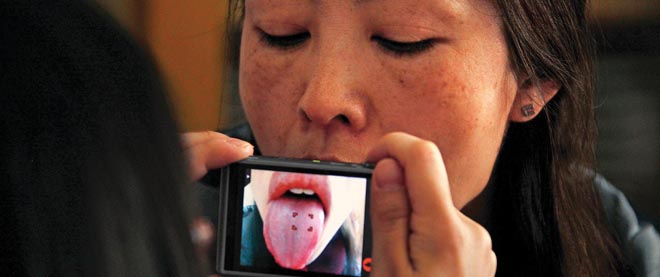Traditional Chinese medicine tongue diagnosis gains favour
Westerners seek out alternative therapy
David Gray/Reuters
Share

Holly Fennell sees about 50 tongues a week. The first thing the naturopath looks at is the colour. A “nice pinky-red” is normal, but many of her patients have a dark purple hue, which is her first clue that there is something off with their energy, or ch’i. A yellowish coating may indicate the flu or a cold. If the outside edge is bumpy, it could be a sign of anxiety. And Fennell, who has been practising Chinese medicine in Toronto’s tony Summerhill neighbourhood for 10 years, has a very deep line down the middle of hers, which she says points to her asthma. Patients think she is psychic, the way she reads their tongues.
Jen Miller, who lives in Toronto, has seen two traditional Chinese medicine (TCM) doctors. The first time, she was feeling sluggish, headachey and queasy, “not really a surprise because I’d recently had a bad breakup.”
The TCM doctor examined her mouth with a depressor and a little light, then asked her to move her tongue up and down. “She said, ‘Oh, not sleeping enough . . . you’re so sad . . . more water will make those headaches stop.’ ” Miller saw a second TCM doctor a year later for stubborn acne. “He started all our visits by looking in my mouth. The first time he looked in and said, ‘Uh! So much candy! All that sugar!’ ” The night before, admits Miller, she had eaten a box of chocolates. “Again, it was fascinating but creepy.”
As Westerners become more proactive about their health and more open to alternatives to conventional medicine, tongue diagnosis is taking off. When TCM practitioner James Rohr started at the Canyon Ranch Hotel and Spa in Miami Beach four years ago, he thought about what would appeal to guests. “The tongue was an easy choice for a lecture, because everyone has one and most people never think twice about theirs.” Due to demand from curious guests, “Let Me See Your Tongue” has been a popular fixture ever since.
Tongue diagnosis is hardly new; it has been used in more than 3,000 years of Chinese medicine. “Every medical system has to have a way to ‘see’ inside the body,” says the Miami-based acupuncture and herbal therapy specialist. While Western medicine relies on blood work, scans and X-rays, Chinese medicine uses the much less expensive—not to mention readily accessible—tongue.
Any deviation from normal—“It just looks healthy, like a good piece of meat,” Rohr says on his website video—“shows some energetic imbalance with that person.” Over time, with acupuncture or herbs and special teas, the tongue recovers as the patient heals.
Common diagnoses from tongue exams include insomnia, digestive upsets, headaches, constipation and allergies. “If you think of illness like a tree with roots and branches, the branches are the symptoms while the roots are the underlying causes. The tongue often gives us a picture of the roots so that we can identify the energetic patterns that would lead this person to manifest symptoms, or the branches, in particular areas of the body,” says Rohr. “The tongue is like a barometer that is constantly giving you feedback about the choices you’re making in your life.”
Western-trained doctors are often skeptical of Eastern medicine, and tongue diagnosis is no exception. At Southlake Regional Health Centre in Newmarket, Ont., emergency-room physician Jason Falk is not peering into patients’ mouths to check their ch’i. “I’ve never heard of tongue diagnosis and I’ve been working for 18 years,” he says. “What can I say? I don’t look at them much. The tongue is not a big focus of mine.” Using the tongue as a diagnostic tool, the one thing Falk says he could deduce is whether or not the person is a coffee drinker.
Rohr says healthy tongues are becoming harder to find. “I’ve seen tongues that have black coatings, peeled coatings, cracked all over, super swollen and huge tongues and very, very short ones. You name it and I’ve seen it.”
Now Rohr has invented an app called Tungz! that provides pictures of healthy tongues. He’s also marketed a line of herbal teas to treat sick ones. But he’s learned to keep a low profile at social gatherings, because once people find out what he does, they are far from tongue-tied: “Even at parties, people stick their tongues out at me.”